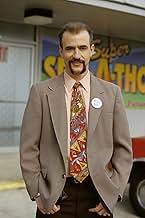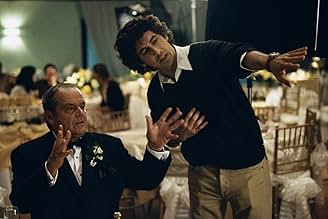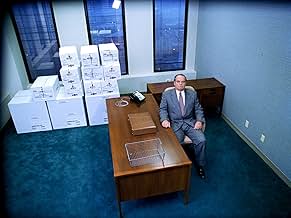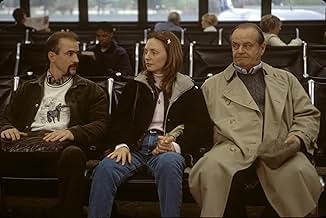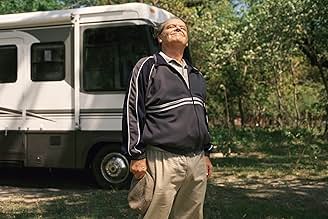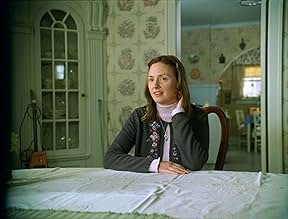AVALIAÇÃO DA IMDb
7,2/10
136 mil
SUA AVALIAÇÃO
Um homem aposentado embarca em uma viagem ao casamento de sua filha, apenas para descobrir mais sobre si e a vida que esperava.Um homem aposentado embarca em uma viagem ao casamento de sua filha, apenas para descobrir mais sobre si e a vida que esperava.Um homem aposentado embarca em uma viagem ao casamento de sua filha, apenas para descobrir mais sobre si e a vida que esperava.
- Direção
- Roteiristas
- Artistas
- Indicado a 2 Oscars
- 25 vitórias e 71 indicações no total
James M. Connor
- Randall's Best Man
- (as James Micheal Connor)
Marilyn Tipp
- Neighbor Lady
- (cenas deletadas)
- Direção
- Roteiristas
- Elenco e equipe completos
- Produção, bilheteria e muito mais no IMDbPro
Avaliações em destaque
I spent a day watching "About Schmidt", with Jack Nicholson... and then the evening rambling through reviews, since my wife's perception of the ending differed somewhat from mine....
Conflict can often lead to enlightenment and discovery, but not so in the case of Warren Schmidt. In his case it leads to a life of complacency, denial, delusion, and passive-aggressive behaviors... and eventually, to a meaningless life of servitude devoid of passion or purpose.
Since my wife and I are around the same age as the character, and we ponder the same issues of our lives, the film had more significance to us. I found the work to be a cinema-graphic piece of art laced with symbolism and dark humor (at best). I likened it to previous movies like "Death of a Salesman", "The Apartment", "The Swimmer" (Burt Lancaster), or a short filmed called "The Bridge".
As a cautionary tale (or social comment) on the "American Way" of life, the messages it conveys are slightly exaggerated, but nevertheless there to be debated. We are talking about identity, achievement, interpersonal relationships, and the "average IQ".
In the end, I believe this film will become one that is studied in future classrooms, and it was brave of Nicholson to participate in such a character study and a work intended primarily for writers, actors, and directors. If laughter is "the sound we make when we are surprised (or shocked) by the truth", then the amount of humor you find in this film may be directly related to your own level of naivety or denial. After all, laughter can often be just another defense mechanism, right?
Some movies are straightforward, some are magical, some are mystical, and then, some are symbolic. This movie falls into the last category. The use of time, space, cognitive dissonance, and Irony abound in this work and challenge us to look, think, and feel.
Notes: we would have cut or altered the "Percodan scene" at the rehearsal (as overdone), also note- the cattle at the funeral who later appear on the freeway, inside jokes about Des Moines and Denver, Randall's "Certificate of Attendance", the look on Jeannie's face at the end of Warren's speech at the Wedding Reception, the use of "overstatement", details of wall decorations, and Warren's obvious attraction to the trite, idealistic, delusional, and superficial.
If you are a thinking, feeling, serious movie-lover, you should SEE this film once, and then STUDY it the 2nd time!
Conflict can often lead to enlightenment and discovery, but not so in the case of Warren Schmidt. In his case it leads to a life of complacency, denial, delusion, and passive-aggressive behaviors... and eventually, to a meaningless life of servitude devoid of passion or purpose.
Since my wife and I are around the same age as the character, and we ponder the same issues of our lives, the film had more significance to us. I found the work to be a cinema-graphic piece of art laced with symbolism and dark humor (at best). I likened it to previous movies like "Death of a Salesman", "The Apartment", "The Swimmer" (Burt Lancaster), or a short filmed called "The Bridge".
As a cautionary tale (or social comment) on the "American Way" of life, the messages it conveys are slightly exaggerated, but nevertheless there to be debated. We are talking about identity, achievement, interpersonal relationships, and the "average IQ".
In the end, I believe this film will become one that is studied in future classrooms, and it was brave of Nicholson to participate in such a character study and a work intended primarily for writers, actors, and directors. If laughter is "the sound we make when we are surprised (or shocked) by the truth", then the amount of humor you find in this film may be directly related to your own level of naivety or denial. After all, laughter can often be just another defense mechanism, right?
Some movies are straightforward, some are magical, some are mystical, and then, some are symbolic. This movie falls into the last category. The use of time, space, cognitive dissonance, and Irony abound in this work and challenge us to look, think, and feel.
Notes: we would have cut or altered the "Percodan scene" at the rehearsal (as overdone), also note- the cattle at the funeral who later appear on the freeway, inside jokes about Des Moines and Denver, Randall's "Certificate of Attendance", the look on Jeannie's face at the end of Warren's speech at the Wedding Reception, the use of "overstatement", details of wall decorations, and Warren's obvious attraction to the trite, idealistic, delusional, and superficial.
If you are a thinking, feeling, serious movie-lover, you should SEE this film once, and then STUDY it the 2nd time!
This is an inspiring story. It teaches me so much about what is important in life. Jack Nicholson, with a great performance as Warren R. Schmidt is an example of an American middle class after retiring. For many years he has worked as an actuary at a big insurance company. After retiring, Jack at home, while watching television, he decides to sponsor a six years old boy (Ndugu) from Tanzania. Sending a check of US$ 22,00 every month, he is also required to write a letter to the boy. In the process of writing these letters, he vents out to the boy about his life frustrations, his lost dreams and the dilemma he is in. He is married for forty-two years with his wife Helen (June Squibb) and he has a daughter living in Denver, Jeannie Schmidt (Hope Davis) who will marry a looser pretty soon. He misses his daughter. A few days after his retirement, his wife dies, and Jack realizes how important the wife was in his life now even though he never appreciated her. The director of the movie, Alexander Payne takes the audiences with Jack on a trip in a trailer to visit specific places in America. He mainly makes Jack visit the places where he has been before physically but at the same time Jack was revisiting his own life inside. In this trip he realizes what really matters in life - friendship, family and sharing- then why it is important to appreciate them whenever you have a chance.
In 'Citizen Kane' (1941), the director Orson Welles portrays the same idea when creating Mr. Kane. The movie is more than the story of a tycoon's rise and fall; it is an account of what is ultimately important in a person's life. Even though Kane attains riches and prestige, he is far from happy. He ends with two failed marriages and few friends. At his dying bed, all he has left is his reminiscences - and something called "Rosebud." In 'About Schmidt' the director Alexander Payne uses voiceover to convey Jack's thoughts and memories throughout the movie. To be specific it is when Jack is writing a letter to the boy he sponsors - (Ndugu), at the same time Payne is informing the audience about Jack's regrets and pain concerning his wife and daughter while the movie is still rolling on. I think this is a great technique.I believe this has been a great adventure and wake up call to many Americans as to what is important in life and why we should cherish every moment of it.
In 'Citizen Kane' (1941), the director Orson Welles portrays the same idea when creating Mr. Kane. The movie is more than the story of a tycoon's rise and fall; it is an account of what is ultimately important in a person's life. Even though Kane attains riches and prestige, he is far from happy. He ends with two failed marriages and few friends. At his dying bed, all he has left is his reminiscences - and something called "Rosebud." In 'About Schmidt' the director Alexander Payne uses voiceover to convey Jack's thoughts and memories throughout the movie. To be specific it is when Jack is writing a letter to the boy he sponsors - (Ndugu), at the same time Payne is informing the audience about Jack's regrets and pain concerning his wife and daughter while the movie is still rolling on. I think this is a great technique.I believe this has been a great adventure and wake up call to many Americans as to what is important in life and why we should cherish every moment of it.
Jack Nicholson is part of these unique actors who are not afraid of playing demeaning parts.While most of his peers in their sixties/seventies are still playing heroes ,see what he does.He has almost never played the brilliant-lawyer-with-good-prospects.Two examples :"one flew over the cuckoo's nest" and the overlooked "Ironweed" which almost nobody knows and which paired him with an equally extraordinary Meryl Streep.
"About Schmidt" is a very good film,cause it succeeds in blending comedy and drama.And this drama involves US ,cause like Schmidt we are all potentially retired people .We are afraid of losing our job for good (the scene when Nicholson returns to his office is revealing),we are afraid to live with a partner getting old (who's THAT old woman living in my house?) ,we try to enlighten our children for fear they might go astray (and the daughter's family-in-law has nothing to recommend them)... and most of all,we are afraid of this: when you reach 65,you take stock of your life and you realize it's an unfulfilled one.Then you live in the past conditional.
That's why the little African boy is so important;although we never see him ,he's a character in the story: a confident ,and finally,when Nicholson begins to cry,the one thing he can be proud of.The letters he writes to his foster child provides the movie with an unusually inventive use of the voice over.
There are numerous memorable scenes:my favorite is Nicholson's speech during the wedding meal:his attitude is in direct contrast to the praises he says to everyone ,particularly to his daughter's mother-in-law ( Kathy Bates is sensational).
Recommended.
"About Schmidt" is a very good film,cause it succeeds in blending comedy and drama.And this drama involves US ,cause like Schmidt we are all potentially retired people .We are afraid of losing our job for good (the scene when Nicholson returns to his office is revealing),we are afraid to live with a partner getting old (who's THAT old woman living in my house?) ,we try to enlighten our children for fear they might go astray (and the daughter's family-in-law has nothing to recommend them)... and most of all,we are afraid of this: when you reach 65,you take stock of your life and you realize it's an unfulfilled one.Then you live in the past conditional.
That's why the little African boy is so important;although we never see him ,he's a character in the story: a confident ,and finally,when Nicholson begins to cry,the one thing he can be proud of.The letters he writes to his foster child provides the movie with an unusually inventive use of the voice over.
There are numerous memorable scenes:my favorite is Nicholson's speech during the wedding meal:his attitude is in direct contrast to the praises he says to everyone ,particularly to his daughter's mother-in-law ( Kathy Bates is sensational).
Recommended.
I love Nicolson and I thought his work in this film was as good as any I have seen him do in any of his previous films. My accolades must begin with the writers for creating such a beautiful novel and script-a perfect canvas for the many fine actors in this film upon which they wove their considerable magic. There were no killings, no car chases, no violence of any kind-I'm surprised that Hollywood distributed it.
Such a slice of life-American life with it's many warts-warts that the Americans probably don't even recognize: Winnebagos like moving palaces, freeway monuments to genocide, business that consumes it's workers only to dump them unceremoniously, too much of everything that amounts to emptiness, etc., etc. The novel by Begley, upon which the film was based, illustrated this consumer emptiness brilliantly by the inclusion of the bookends to the film, the sponsorship of the Tanzanian child by Schmidt. The child's material emptiness was contrasted with Schmidt's emotional emptiness in a way America does not recognize much less watch on the screen.
The last part of the movie dealing with the marriage of Schmidt's daughter to a man who came from a diametrically opposite "new age" family was an unstated acknowledgment by his daughter that she wanted nothing of her father's values-she wanted a complete break and she was going to marry the break.
A fascinating, complex movie and I'm sorry I didn't see it much earlier.
Such a slice of life-American life with it's many warts-warts that the Americans probably don't even recognize: Winnebagos like moving palaces, freeway monuments to genocide, business that consumes it's workers only to dump them unceremoniously, too much of everything that amounts to emptiness, etc., etc. The novel by Begley, upon which the film was based, illustrated this consumer emptiness brilliantly by the inclusion of the bookends to the film, the sponsorship of the Tanzanian child by Schmidt. The child's material emptiness was contrasted with Schmidt's emotional emptiness in a way America does not recognize much less watch on the screen.
The last part of the movie dealing with the marriage of Schmidt's daughter to a man who came from a diametrically opposite "new age" family was an unstated acknowledgment by his daughter that she wanted nothing of her father's values-she wanted a complete break and she was going to marry the break.
A fascinating, complex movie and I'm sorry I didn't see it much earlier.
About Schmidt is Forrest Gump through the lens of Sartre or Camus. Warren Schmidt has a handicap, but it's the same handicap most of the people standing on line at seven p.m. at your local Wendy's have. The real star (or anti-star) of About Schmidt is the mediocre architectural landscape of America. Every room or box Warren Schmidt enters in this movie is as devoid of caring and vitality as he is: the retirement banquet room, Warren's house, the tire store, the hired wedding reception room. Schmidt's director and production designer take care to place us in the same life-draining, cheap structures we inhabit and deal with everyday. No prettifying. This is the drab landscape of Fargo revisited, but without the irony. The steady doses of violence in Fargo allowed you an escape route. But there's nothing ironical about a wasted life and a 66 year old widower spinning his wheels in the same rut, now partnerless and foundering. The combination of Jack, this story and these settings is effective and compelling. The result would be, I think, inevitable. The tone and attitude is not consistently managed, even by Nicholsen, whose worn-out, mannered schtick pops up occasionally. Yet the final effect is impossible to fend off: mundane American hell with droll comedic diversion. We experience a downfall as poignant as the smell of bacon cooking in Denny's at eight a.m.
Like Forrest Gump, the film depends on extensive voice over narration, V.O'd by Nicholsen as letters to Schmidt's newly adopted six year old Tanzanian foster child. Through these ridiculous sharings of sextagenarian angst with an African boy, we register Schmidt's internal grievances - thoughts we would never know about otherwise without his commentary. The slow dragging score drains vitality from each transition, as if cinematic momentum would be antithetical to the point of the tale. Back and forth we rock from a single minor chord to a second one, getting nowhere. The mood, the landscape, the buildings, the people say it all: Schmidt's on the road, but he might as well be sitting home in his lay-z-boy. The cushy bucket seat of a 35 foot Winnebago makes a good substitute.
Casting Jack Nicholson may have been the only way this story could have come to the screen. I've racked my brain to think of one other actor who could have pulled Schmidt off. Tony Hopkins? Not with the same comedic finesse. Gene Hackman reprising his role in Coppola's The Conversation or doing his Tennenbaum hamming? Don't think so. Only Jack has the mix. He does some hilarious bits in this, but overall the mood is somber, glum, inert. Can this be how that other famous Warren from Nebransas - Mr. Buffet - lives?
I was confused, amused, depressed and wierdly disoriented by About Schmidt as I left the theater. I commented that it wasn't a film I'd go see again. Thinking about it a day later, I'd hold to that IF it meant returning to the theater and paying. BUT - were I to run across About Schmidt on cable, I doubt I could tear myself away from it any more than I could from a crack up at the Indy 500. And I think that chance encounter might happen more than once, maybe for years. After all, this is the America I know and mark time in myself. A recommended film going experience.
Like Forrest Gump, the film depends on extensive voice over narration, V.O'd by Nicholsen as letters to Schmidt's newly adopted six year old Tanzanian foster child. Through these ridiculous sharings of sextagenarian angst with an African boy, we register Schmidt's internal grievances - thoughts we would never know about otherwise without his commentary. The slow dragging score drains vitality from each transition, as if cinematic momentum would be antithetical to the point of the tale. Back and forth we rock from a single minor chord to a second one, getting nowhere. The mood, the landscape, the buildings, the people say it all: Schmidt's on the road, but he might as well be sitting home in his lay-z-boy. The cushy bucket seat of a 35 foot Winnebago makes a good substitute.
Casting Jack Nicholson may have been the only way this story could have come to the screen. I've racked my brain to think of one other actor who could have pulled Schmidt off. Tony Hopkins? Not with the same comedic finesse. Gene Hackman reprising his role in Coppola's The Conversation or doing his Tennenbaum hamming? Don't think so. Only Jack has the mix. He does some hilarious bits in this, but overall the mood is somber, glum, inert. Can this be how that other famous Warren from Nebransas - Mr. Buffet - lives?
I was confused, amused, depressed and wierdly disoriented by About Schmidt as I left the theater. I commented that it wasn't a film I'd go see again. Thinking about it a day later, I'd hold to that IF it meant returning to the theater and paying. BUT - were I to run across About Schmidt on cable, I doubt I could tear myself away from it any more than I could from a crack up at the Indy 500. And I think that chance encounter might happen more than once, maybe for years. After all, this is the America I know and mark time in myself. A recommended film going experience.
Você sabia?
- CuriosidadesWhen Jack Nicholson received the Golden Globe for Best Actor in a Drama, he commented afterward, "I'm a little surprised. I thought we had made a comedy."
- Erros de gravaçãoAt the wedding, the priest/minister wears the wrong color of vestments: a purple chasuble and blue stole - purple is for Lent and blue is for Advent. The appropriate color for a wedding in terms of church vestments (be it Catholic, Episcopalian or other) is white.
- Citações
Warren Schmidt: Relatively soon, I will die. Maybe in 20 years, maybe tomorrow, it doesn't matter. Once I am dead and everyone who knew me dies too, it will be as though I never existed. What difference has my life made to anyone. None that I can think of. None at all.
- Cenas durante ou pós-créditosThe film title appears above the New Line Cinema Release credit as end credits are done.
- ConexõesEdited into Nudes in the News: Show #102 (2005)
- Trilhas sonorasYou Sexy Thing
Written by Errol Brown and Tony Wilson
Performed by Hot Chocolate
Courtesy of EMI Records Ltd.
Under license from EMI-Capitol Music Special Markets
Principais escolhas
Faça login para avaliar e ver a lista de recomendações personalizadas
- How long is About Schmidt?Fornecido pela Alexa
Detalhes
- Data de lançamento
- País de origem
- Idioma
- Também conhecido como
- Las confesiones del Sr. Schmidt
- Locações de filme
- Messiah Lutheran Church, 5015 S. 80th Street, Omaha, Nebraska, EUA(Church where the wedding takes place)
- Empresas de produção
- Consulte mais créditos da empresa na IMDbPro
Bilheteria
- Orçamento
- US$ 30.000.000 (estimativa)
- Faturamento bruto nos EUA e Canadá
- US$ 65.016.287
- Fim de semana de estreia nos EUA e Canadá
- US$ 282.367
- 15 de dez. de 2002
- Faturamento bruto mundial
- US$ 105.834.556
- Tempo de duração2 horas 5 minutos
- Cor
- Mixagem de som
- Proporção
- 1.85 : 1
Contribua para esta página
Sugerir uma alteração ou adicionar conteúdo ausente


